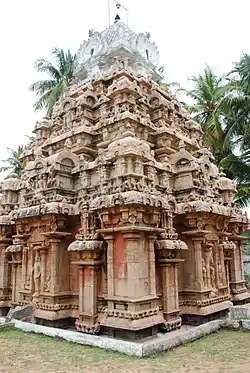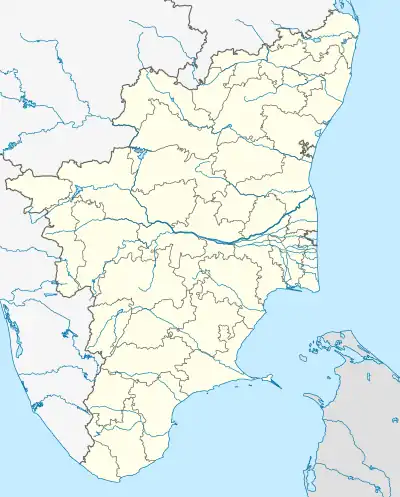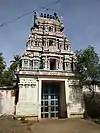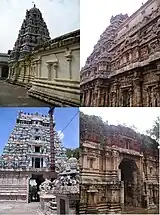Alandurainathar Temple, Pullamangai
Tirupullamangai or Thirupullamangai is a Hindu temple dedicated to Lord Siva located in Pasupathikoil, Papanasam taluk of Thanjavur district, Tamil Nadu, India. It is one of the shrines of the 275 Paadal Petra Sthalams - Shiva Sthalams glorified in the early medieval Tevaram poems by Tamil Saivite Nayanar Tirugnanasambandar.
| Pasupathi Kovil | |
|---|---|
 | |
| Religion | |
| Affiliation | Hinduism |
| District | Thanjavur |
| Deity | Brahmapureeswarar(Shiva) Anandeeswarar(Shiva) |
| Location | |
| Location | Pasupathikoil |
| State | Tamil Nadu |
| Country | India |
 Location in Tamil Nadu | |
| Geographic coordinates | 10°53′N 79°10′E |
| Architecture | |
| Type | Dravidian architecture |
Architecture

The lord of this temple Shiva as Brahamapurisvarar is also known as Alandurai Mahadevar. The temple has been revered by the verses of sambandar, one of the Nayanmars.
The shrine of Lord Siva faces east; the temple is entered through a small gopuram(entrance tower) on the eastern side of the enclosing wall. Both of these, along with the hall, directly in front of the entrance, are of recent date, as are various subsidiary buildings on either sides of the gopuram and the goddess shrine in the north of the hall. The original parivara (attendant deities) have disappeared.[1] The temple is counted as one of the temples built on the banks of River Kaveri. It is located on the banks of Kudamurutti River, a tributary of river Kaveri.[2]
Saptamangai sthalam
This temple is one of the seven shrines associated with Saptamartrikas (seven female deities in Siva temple).[3] Matrikas are the different forms Adi Parashakti.[4] Matrikas are the personified powers of different Devas. Brahmani emerged from Brahma, Vaishnavi from Vishnu, Maheshvari from Shiva, Indrani from Indra, Kaumari from Skanda, Varahi from Varaha and Chamunda from Devi,[5] and additionals are Narasimhi, Vinayaki. This is one of the Saptamangai sthalams, seven sacred places devoted to Devi.[6] They are also called as Saptastanam of Chakkarappalli.[7] They are:
History
The temple should have existed as a brick structure from 7th Century. The stone temple should have been built during the reign of Parantaka Chola I, which is evident from the inscriptions found in the temple. There are also inscriptions from the period of Sundara Chola, Adiya Karikalan and Raja Raja Chola I.
According to historian Harle, the temple is counted among the four early extant temples of the Chola Empire, with the other three being Koranganatha Temple in Tiruchirappalli district, Moovar Koil in Pudukottai district and Nageswaran temple at Kumbakonam These temples follow the Pallava architecture which are relatively small in size. They all have a fair-sized porch, locally called ardhamandapa attached to the sanctum, both of which are slightly below the ground level in a pit kind of structure. The structures are also predominantly built of stone.[8]
The garbhagriha(sanctum) and the arthamandapa(secluded hall) of the temple belong to the earlier structure, while there have been newer structures added to it lately. All the parivara(consort) shrines of the earlier period have not survived and few newer shrines have come up. The sculptures of this temple is highly acclaimed for its beauty. Apart from the lovely devakoshta(divine) images of Dakshinamurthy, Lingodhbhavar, Brahma and Durga, the vimana(shrine) too houses exquisite images of Vishnu, Narashima, Tripurantaka. The temple has series of miniature panels depicting scenes from Ramayana. The sculpting in this temple is of high class and speaks volume of Chola artistry.[9]
Notes
- Harle 1958, p. 10
- Ka. Vi., Kannan (2019). River cauvery the most battl(r)ed. Notion Press. p. 30. ISBN 9781684666041.
- கடம்பூர் விஜயன், சப்தமங்கைத் தலங்கள், பகுதி 1, அரியமங்கை, தினமணி, 16 சூன் 2018
- சப்தமாதர்களும் சக்தியின் அம்சங்களே, ஆன்மிகம்
- Leeming, David; Fee, Christopher (2016). The Goddess: Myths of the Great Mother. Reaktion Books. ISBN 9781780235387.
- சாதிக்க வைக்கும் சப்த மங்கை தலங்கள்!, தினகரன், 12 அக்டோபர் 2018
- Ayyampet N.Selvaraj, Study on the Saptastanam (Seven Sacred Places) of Chakkarappalli in Thanjavur District, Nehru Trust for the Indian Collections at the Victoria & Albert Museum, New Delhi, May 2011
- Harle 1958, p. 9
- Tourist Guide to Tamil Nadu.P.77
References
- Harle, James C. (1958). The Brahmapuriswara temple at Pullamangai (PDF). Bombay: Bhulabhai Memorial Institute.







